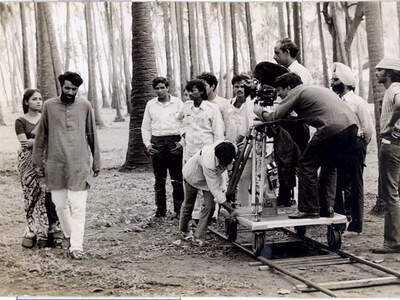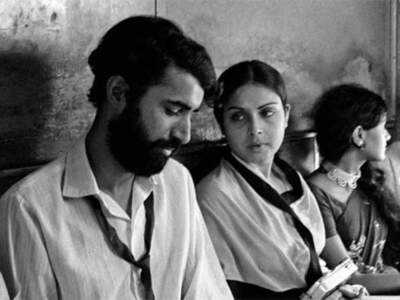In this world of cinema, some names may not shine for long but leave behind a legacy that echoes for decades. One such personality is Awtar Krishna Kaul. He is the man behind the timeless classic 27 Down (1974). Though he made just one feature film, it won two National Film Awards and remains a milestone in Indian parallel cinema. But Kaul’s real-life story is as poignant and dramatic as any film.
All you need to know about Awtar Kaul
Awtar Krishna Kaul was born on September 27, 1939, in Fatehkadal, a neighbourhood in Srinagar, Kashmir. He grew up in a modest household with no background in cinema or theatre. One of six siblings, his early years were filled with warmth, especially in the care of his maternal family in Safakadal. However, his journey to becoming a filmmaker was anything but easy.
As a young man, Awtar Kaul faced personal and financial challenges. After a conflict at home, he was thrown out by his father. Alone and with little support, he worked at a tea stall on a railway platform and later found employment at a hotel in Ambala. Determined to continue his education, he completed his graduation through open schooling, all while juggling jobs to make ends meet.

Eventually, Awtar secured a Class IV job in the Ministry of External Affairs. However, this modest government job proved to be life-changing. It gave him the chance to be posted in the United States, where a whole new world opened up to him. In New York, he enrolled at the City University of New York and earned a bachelor’s degree in film.
He took up various small jobs to support himself, including working as a copyholder and later a news brief writer for international media organisations like the Associated Press and British Information Services. One editor, impressed by Kaul’s intellect and reading habits, helped him grow within the newsroom.
Return to India and Breakthrough
In the US, Awtar Kaul met and married Anne, who would become his lifelong partner. The couple returned to India in 1970. Soon after, he was hired by the famed Merchant Ivory Productions as an Assistant Director on the film Bombay Talkie. This experience gave him a first look at professional filmmaking in India and prepared him for his own directorial debut.
In 1974, he wrote, directed, and produced 27 Down, a film that told the story of an ordinary man caught between duty and desire. The film was hailed for its unique narrative structure, striking black-and-white cinematography, and raw emotional depth. It went on to win two National Film Awards, including Best Feature Film in Hindi.

Just months after 27 Down was released, tragedy struck. On July 20, 1974, while in Walkeshwar, Bombay, Awtar Kaul died trying to save a girl from drowning, according to TOI. He was just 34 years old. His brave final act shocked the film fraternity and left his family and admirers devastated.
For decades, Awtar Kaul remained a forgotten name, remembered only by passionate cinephiles and critics. But in recent years, his family and collaborators have started piecing together his life and legacy, collecting stories, interviews, and memories to ensure he is not lost to time.
All you need to know about Awtar Kaul
Awtar Krishna Kaul was born on September 27, 1939, in Fatehkadal, a neighbourhood in Srinagar, Kashmir. He grew up in a modest household with no background in cinema or theatre. One of six siblings, his early years were filled with warmth, especially in the care of his maternal family in Safakadal. However, his journey to becoming a filmmaker was anything but easy.
As a young man, Awtar Kaul faced personal and financial challenges. After a conflict at home, he was thrown out by his father. Alone and with little support, he worked at a tea stall on a railway platform and later found employment at a hotel in Ambala. Determined to continue his education, he completed his graduation through open schooling, all while juggling jobs to make ends meet.
Eventually, Awtar secured a Class IV job in the Ministry of External Affairs. However, this modest government job proved to be life-changing. It gave him the chance to be posted in the United States, where a whole new world opened up to him. In New York, he enrolled at the City University of New York and earned a bachelor’s degree in film.
He took up various small jobs to support himself, including working as a copyholder and later a news brief writer for international media organisations like the Associated Press and British Information Services. One editor, impressed by Kaul’s intellect and reading habits, helped him grow within the newsroom.
Return to India and Breakthrough
In the US, Awtar Kaul met and married Anne, who would become his lifelong partner. The couple returned to India in 1970. Soon after, he was hired by the famed Merchant Ivory Productions as an Assistant Director on the film Bombay Talkie. This experience gave him a first look at professional filmmaking in India and prepared him for his own directorial debut.
In 1974, he wrote, directed, and produced 27 Down, a film that told the story of an ordinary man caught between duty and desire. The film was hailed for its unique narrative structure, striking black-and-white cinematography, and raw emotional depth. It went on to win two National Film Awards, including Best Feature Film in Hindi.
Just months after 27 Down was released, tragedy struck. On July 20, 1974, while in Walkeshwar, Bombay, Awtar Kaul died trying to save a girl from drowning, according to TOI. He was just 34 years old. His brave final act shocked the film fraternity and left his family and admirers devastated.
For decades, Awtar Kaul remained a forgotten name, remembered only by passionate cinephiles and critics. But in recent years, his family and collaborators have started piecing together his life and legacy, collecting stories, interviews, and memories to ensure he is not lost to time.
You may also like

Ex-Arsenal striker in coma with brain injury after horrific head collision during match

Terror suspects seen, search operation launched in Kathua

Arne Slot responds to Jack Grealish's Merseyside derby complaint - 'Completely correct'

Viral video shows Trinamool leader selling firearms in Bengal's Birbhum

Indore: 'No Car Day' Saves 1.8 Lakh Litres Fuel, Cuts 445 Metric Tonnes Carbon Emission






